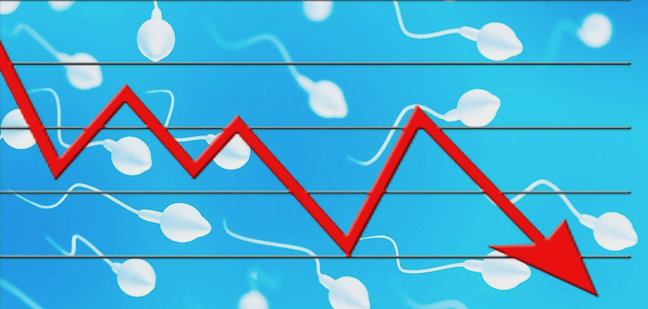The recent research revelation that sperm counts for men living in the West have plunged by 60 percent since 1971 provides readers of P.D. James’ great dystopian novel, The Children of Men, with a prediction of an unsettling future for a society that can no longer reproduce. Set in Britain in 2021, James’s frightening fiction described a world of mass infertility among males – a world in which no children have been born in more than twenty-five years. In the novel, the last baby to be born is now an adult, and the population is growing steadily older. And, like today’s reality, James’s scientists have failed to find a cure – or even a cause – for the sterility.
Publishing their most recent findings in the journal Human Reproduction Update, the researchers – from Israel, the United States, Denmark, Brazil, and Spain – concluded that the total sperm count had fallen by 59.3 percent between 1971 and 2011 in Europe, North America, Australia, and New Zealand.
Some scientists are claiming that “modern living” has caused serious damage to men’s health. Pesticides, pollution, diet, stress, smoking, and obesity have all been plausibly associated with the problem. But far fewer men smoke cigarettes than ever before, and the pollution and pesticide controls that the government has implemented in the past forty years have alleviated many of these risks.
Besides, during the Industrial Revolution in the 1800s, men faced much greater health risks from factory work during a time when there were no OSHA regulations on air quality. There were few fertility problems at that time as families were large – and no one worried about sperm counts.
Obesity could be a contributor, but researchers have failed to find confirmation of the link. To attempt to determine whether diet was affecting male fertility, researchers at Loma Linda University Medical School embarked on a four-year project investigating a large population of Seventh Day Adventist Christians who are strict vegetarians as a requirement of their religion. Findings revealed that the vegetarians had significantly lower sperm counts and lower average sperm motility than meat eaters. But veganism is still a minority lifestyle choice, especially for men, and could never account for the drop.
The causes for the deep declines in fertility remain unknown. But to understand the consequences of a sterile society, P. D. James’s cautionary tale describes a grim world in which a totalitarian government has emerged to keep order – and provide “comfort” to the residents. It’s a world in which pets have become child-substitutes, and religion appears to have lost its meaning. Yet in a feeble attempt to continue the Christian rituals, Anglican Churches hold elaborate christening ceremonies for the pet kittens of the populace, replete with christening gowns and bonnets.
In P.D. James’s sterile society, sex among the young has become “the least important of man’s sensory pleasures.” And although men and women still marry, it is often with the same sex. Sexual desire declined along with male fertility, despite government efforts to stimulate desire through government-sponsored porn shops.
In some ways, James’s novel describes a society that got exactly what it wanted: sexual pleasure without the risk of pregnancy. But the irony is that when there is no possibility of procreation, sex loses its meaning. We are increasingly faced with that fact today as we continue to debate over whether the government should be requiring all taxpayers, including those with religious concerns, to pay for full “reproductive rights” for all women in a time of growing concerns over male infertility.
Anthropologists and sociologists have long known that human fertility with attendant population needs must be considered from a cultural perspective. Culture is the way of life or the design for living characterizing each human society. It includes the shared values, norms, and behaviors of a given society.
To understand human fertility rates and population declines, cultural influences must be identified and modified. Culture is significant in understanding human fertility rates and in modifying sexual activity by relating sex and reproduction to the culture’s value system. When the arrival of a child becomes devalued in a given society, the value of the sex act that produces the child becomes devalued. It must be noted that male fertility rates are falling in the West – not in Africa, where children are highly valued and welcomed in love.
This cultural or sociological perspective was clearly expressed in Humanae Vitae: On the Regulation of Human Births issued by Pope Paul VI on July 25, 1968, which stated that:
The problem of birth, like every other problem regarding human life, is to be considered beyond partial perspectives—whether of the biological or psychological, demographic or sociological orders—in the light of an integral vision of man and of his vocation, not only his natural and earthly, but also his supernatural and eternal vocation.
Perhaps it is time to consider the sociology surrounding the culture of “reproductive rights” we have created – the culture of birth control that we have embraced in the West. We need to ask whether there may be psychic costs to a culture in which birth control and abortion are so important that the Obama administration’s Affordable Care Act mandated all employers – including religious institutions – to provide insurance coverage for free access to birth control and abortifacients for all.
It is important to note that the fertility declines began in 1971, with the advent of the birth control pill and the passage of abortion on demand through Roe v Wade. Could it be that like James’s dystopian novel, there are psychic costs to be considered when we begin to assume that we can control everything in our lives? It’s possible we have over-controlled our own fertility.















